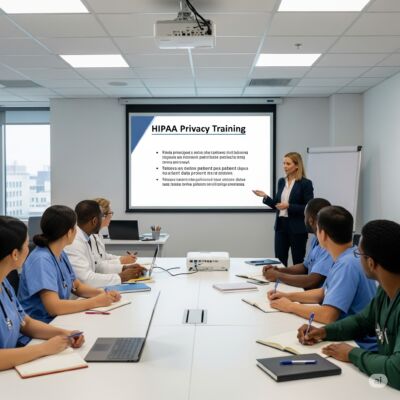In today’s healthcare environment, safeguarding patient information is a legal obligation and an ethical responsibility. The Health Insurance Portability and Accountability Act (HIPAA) outlines strict rules for protecting Protected Health Information (PHI). To meet these requirements, healthcare professionals must undergo HIPAA Privacy Training.
This training ensures staff understand privacy regulations, handle PHI correctly, and avoid costly violations.
What Is HIPAA Privacy Training?
HIPAA Privacy Training educates healthcare workers on the HIPAA Privacy Rule, which governs the use and disclosure of PHI in any format—oral, written, or electronic.
Key topics include:
-
Patient Rights – Access to medical records, request for corrections, and confidentiality.
-
Permitted Uses and Disclosures – When PHI can be shared without patient consent.
-
Minimum Necessary Rule – Limiting PHI access to only what’s needed for job duties.
-
Safeguards – Administrative, physical, and technical measures to protect data.
-
Breach Reporting – Steps to follow when PHI is compromised.
Why Healthcare Staff Must Receive HIPAA Privacy Training
Without proper training, healthcare staff risk unintentional violations, which can lead to:
-
Hefty fines (up to $50,000 per violation)
-
Loss of patient trust
-
Regulatory investigations and penalties
Training empowers staff to confidently handle PHI while ensuring compliance.
Who Needs HIPAA Privacy Training?
-
Doctors, nurses, and allied health professionals
-
Administrative and billing staff
-
Medical records clerks
-
Interns, volunteers, and contractors handling PHI
Best Practices for HIPAA Privacy Compliance
-
Follow the “Minimum Necessary” principle
-
Secure PHI – Lock file cabinets, encrypt digital records, and use password protection.
-
Be cautious with conversations – Avoid discussing patient details in public spaces.
-
Report suspicious activity immediately to compliance officers.
Final Thoughts
HIPAA Privacy Training is essential for all healthcare staff—not only to comply with federal law but to protect patient dignity and trust. Regular training keeps employees informed, prepared, and compliant in a rapidly evolving healthcare environment.
